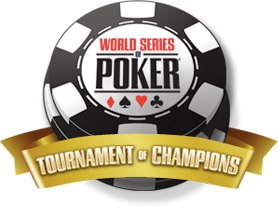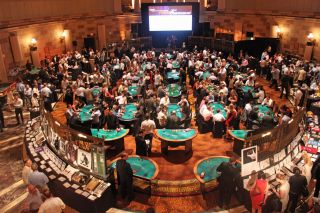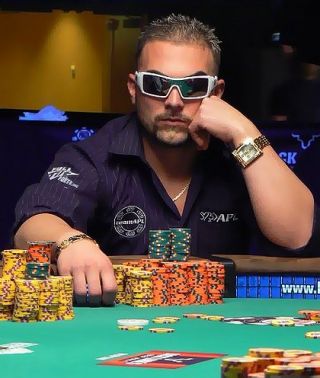Compulsive Behaviors
Contesting Times
What is the role of competitiveness in gambling and problem gambling?
Posted October 30, 2014

Over the last decade, I have been asked by the mass media on countless occasions about the increasing popularity of online gambling. The two biggest successes appear to be the use of betting exchanges and online poker. Gamblers clearly feel these types of gambling provide value and an opportunity to exercise their skill. This is coupled with increasingly sophisticated gaming software, integrated e-cash systems, increased realism (in the shape of “real” gambling via webcams, or player and dealer avatars) are all inter-linked facilitating factors. However, another factor that I feel is really important in the rise of online gambling is the inter-gambler competition. Obviously there is an overlap between competitiveness and skill but they are certainly not the same. What’s more recent research has suggested that being highly competitive may not necessarily be good for the gambler.
I’m sure many people’s view of psychology is that it is little more than common sense (and to be honest, some of it is). For instance, psychologists claim that male gamblers are attracted to sports betting because they love competitiveness. There has also been North American research examining the high participation in US college basketball. The researchers found that above anything else, males were attracted to the competitiveness of betting on teams and games. Professor Howard Shaffer, a psychologist at Harvard University, claims that men are more likely to develop problematic gambling behaviour because of their conventionally high levels of aggression, impulsivity and competitiveness. Clearly, the idea of the competitiveness of the activity being one of the primary motivations to gamble is well supported.

Based on the fact that so little research has systematically examined the links between gambling and competitiveness, my own research unit (led by Dr. Adrian Parke) published some research into this area in the journal Addiction Research and Theory. We speculated that a gambler who is highly competitive would experience more arousal and stimulation, and be drawn to gambling as an outlet to release competitive instincts and drives. We also speculated that competitiveness may be linked to problem gambling. For instance, being highly competitive may help in explaining why in the face of negative and damaging consequences, problem gamblers persist in their potentially self-destructive habit. Psychological research in other areas has consistently shown that highly competitive individuals are more sensitive to social comparison with peers regarding their task performance. Applying this to a gambling situation, it is reasonable to suggest that competitive gamblers may be reluctant to stop gambling until they are in a positive state in relation to opposing gamblers, perhaps explaining why excessive gambling can sometimes occur.
Psychology is not the only discipline to suggest that competitiveness levels can be associated with problem gambling. Sociologists have speculated that factors of the human instinctual expressive needs, such as competition, can be temporarily satisfied when engaging in gambling activities. Evidence exists supporting gambling as an instrumental outlet for expressing competitive instinctual urges. The US sociologist Erving Goffman developed what he called the ‘deprivation-compensation’ theory to explain the relationship between gambling and competitiveness. He suggested that the stability of modern society no longer creates situations where competitive instincts are tested. Therefore, gambling is an artificial, self-imposed situation of instability that can be instrumental in creating an opportunity to test competitive capabilities.

In the published research study that we carried out, we hypothesised that problem gamblers would possess higher levels of competitiveness than non-problem gamblers. Using a competitiveness scale, gamblers were asked to rate statements about competitive reasons for gambling (such as ‘I like to gamble to show others how good I am at it’, ‘I like to gamble to beat the system’, ‘I like to gamble to see how good I am at it’) and general competitive tendencies (such as ‘I am competitive’, ‘I enjoy taking risks’, ‘I am abitious’). We found that problem gamblers scored significantly higher on the competitiveness scale. Put simply, we concluded that having a highly competitive streak may in fact be a potential risk factor for problem gambling.
It is not hard to see how a highly competitive person would be attracted to gambling by the competitive and challenging nature of the behaviour. However, why are competitive people at particular risk of developing pathological gambling behaviour? It could be the case that highly competitive gamblers are less inclined to ‘throw the towel in’ or accept a loss, and, as a result are more prone to chasing behaviour. Chasing behaviour – that is, increasing frequency and stake of bets in an attempt to recoup losses - is self-perpetuating. When gamblers chase losses it is highly probable they will lose more and the need to recoup losses increases as time passes. What’s more, chasing losses has been shown to be a major risk factor in the development of gambling problems. At the other end of spectrum, winning is potentially more rewarding for a competitive gambler as they are more inclined to perceive gambling as an internal and external challenge than a non-competitive gambler. In addition, winning will be much more rewarding after incurring losses. Put very simply, the competitive person feels greater triumph by defeating unlikely odds and emerging from what appeared a hopeless situation.
References and further reading
Goffman, I. (1972). Where the action is. In: Interaction Ritual (pp.149–270). Allen Lane, London.
Griffiths, M.D. (2010). Gambling addiction on the Internet. In K. Young & C. Nabuco de Abreu (Eds.), Internet Addiction: A Handbook for Evaluation and Treatment (pp. 91-111). New York: Wiley.
Kuss, D.J. & Griffiths, M.D. (2012). Internet gambling behavior. In Z. Yan (Ed.), Encyclopedia of Cyber Behavior (pp.735-753). Pennsylvania: IGI Global.
McCormack. A. & Griffiths, M.D. (2012). What differentiates professional poker players from recreational poker players? A qualitative interview study. International Journal of Mental Health and Addiction, 10, 243-257.
Parke, A. & Griffiths, M.D. (2011). Poker gambling virtual communities: The use of Computer-Mediated Communication to develop cognitive poker gambling skills. International Journal of Cyber Behavior, Psychology and Learning, 1(2), 31-44.
Parke, A., Griffiths, M.D. & Irwing, P. (2004). Personality traits in pathological gambling: Sensation seeking, deferment of gratification and competitiveness as risk factors, Addiction Research and Theory, 12, 201-212.
Parke, A., Griffiths, M., & Parke, J. (2005) Can playing poker be good for you? Poker as a transferable skill. Journal of Gambling Issues, 14. http://jgi.camh.net/doi/full/10.4309/jgi.2005.14.12
Recher, J. & Griffiths, M.D. (2012). An exploratory qualitative study of online poker professional players. Social Psychological Review, 14(2), 13-25.
Wood, R.T.A. & Griffiths. M.D. (2008). Why Swedish people play online poker and factors that can increase or decrease trust in poker websites: A qualitative investigation. Journal of Gambling Issues, 21, 80-97.




